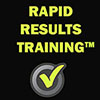
The power of suggestion is where the phrase "I put a spell on you" comes from. The word "spell" actually comes from the Old English word "spellian," which means to talk or speak
This highlights the fact that words are incredibly powerful and can have a significant impact on our thoughts, feelings, and actions
Just as a magician can use spells to influence their audience, sports performers and athletes can use the power of suggestion to enhance their performance. By choosing their words carefully and using positive language, they can create a mindset that empowers them to achieve their goals and perform at their best

“Words and magic were in the beginning one and the same thing, and even today words retain much of their magical power.”
― Sigmund Freud, Introductory Lectures on Psychoanalysis
Rapid Results Trainers can use the power of suggestion to help sports performers and athletes improve their performance and boost their confidence. Here are some ways that Rapid Results Trainers can utilize the power of suggestion for sportspeople:
Reframing negative self-talk: Rapid Results Trainers can help sportspeople reframe negative self-talk by replacing negative messages with positive ones. For example, instead of telling a client not to be nervous, a Rapid Results Trainer™ might suggest that they feel confident and in control.
Positive affirmations: Rapid Results Trainers™ can use positive affirmations to help sports people build confidence and stay focused on their goals. For example, a Rapid Results Trainer™ might suggest that a client repeat affirmations like "I am strong and capable" or "I am focused and determined" to prepare before a game or competition.
It's important for Rapid Results Trainers to use positive messages when making suggestions to sportspeople.
Negative messages can be counterproductive, as they can reinforce negative self-talk and undermine confidence. Instead, Rapid Results Trainers should focus on framing suggestions in positive, empowering language that reinforces the athlete's strengths and abilities. For example, instead of saying "Don't be nervous," a Rapid Results Trainer™ might say, "Feel calm and confident in your abilities." By using positive suggestions, Rapid Results Trainers™ can help sports performers and athletes build confidence, overcome mental barriers, and achieve peak performance.
An example of how the mind works with a negative suggestion would be:
Don’t think of pink elephants. The mind ignores the negative and you think of pink elephants
TRY
For sports performers, the word "try" can have a negative impact on their performance. Using the word "try" implies that there is a possibility of failure, and can create self-doubt and hesitation. Instead of using "try," it's important to focus on the action and the goal. For example, instead of saying "I'll try to hit the ball," say "I hit the ball."
MORE ON HOW TO MAKE SUGGESTIONS
When using the power of suggestion, it's important to use language that suggests the desired outcome has already happened and to say it with confidence. This is because the subconscious mind responds better to positive affirmations that are phrased in the present tense and stated with conviction. Here are some examples of how to use suggestions in this way:
Example 1: Athletic Performance
Instead of saying: "You will improve your athletic performance"
Say with confidence: "You are now performing at your best and achieving your goals with ease."
Example 2: Weight Loss
Instead of saying: "You will lose weight"
Say with confidence: "You are now at your ideal weight and feel fantastic!"
Example 3: Quit Smoking
Instead of saying: "You will quit smoking"
Say with confidence: "You are now a non-smoker and enjoy the benefits of a healthy lifestyle."
In each of these examples, notice how the suggestion is phrased in the present tense as if it has already happened. This is because the subconscious mind responds better to suggestions that are stated as if they are already a reality. Additionally, the use of confident language such as "now" and "fantastic" or "enjoy" and "best" reinforces the idea that the outcome is desirable and achievable.
When using the power of suggestion, it's essential to state your affirmations and suggestions with confidence and conviction. This will help to convince your subconscious mind that the desired outcome is achievable.
A powerful direct suggestion is "I am going to suggest to you that *x*will take root in your subconscious" and just expect it to happen. Providing there is nothing else blocking it in their inner mind it will work. the more you practice it the more you will expect it to work
Remember, the power of suggestion is a tool that can help you achieve your goals, but it should always be used alongside other techniques, particularly visualization and action planning, to maximize its effectiveness.
Metaphors
Metaphors can be incredibly powerful tools for sports performers as they can plant indirect suggestions in the mind that can lead to positive changes in performance.
Case Study
Background: Sarah is a competitive long-distance runner who has been struggling with her performance in recent races. She has been training consistently but has been unable to improve her personal best time. Sarah has tried various techniques, such as changing her training regimen and her diet, but hasn't seen any significant improvements.
The Approach: After the initial consultation with Sarah, I suggested using the power of suggestion to help her overcome any mental barriers that may be holding her back. I explain that the subconscious mind can be influenced through suggestions. These suggestions can help her to develop a more positive mindset and improve her overall performance.
Step 1: Creating a Positive Mindset. I began by using The Focused Awareness Technique*
I then gave a suggestion that she was going to improve in her performance, more than yesterday but not as much as tomorrow and every day thereafter
I also gave suggestions that she can repeat to herself throughout the day to reinforce a positive mindset. Some examples include "I am a strong and confident runner," "My body is capable of achieving my goals," and "I am fully prepared to succeed." I encourage Sarah to write these affirmations down and recite them daily.
I also suggested she write her goals down and report each week to a friend to monitor her and keep her on the path to success
Step 2: Visualization Techniques Next, I introduce visualization techniques to help Sarah mentally prepare for her upcoming races. I encourage her to visualize herself running the race in her mind's eye, focusing on her form and technique, and finishing strong. I also suggested that she visualizes herself achieving her personal best time and crossing the finish line with confidence and joy.
Results: After several weeks of incorporating these techniques into her training regimen, Sarah notices a significant improvement in her performance. She achieves her personal best time in her next race and reported feeling more confident and focused during her training sessions. She credits the power of suggestion with helping her to overcome any mental barriers that were holding her back and achieve her goals.
Conclusion: This case study demonstrates how the power of suggestion can be used to help sports performers and athletes improve their performance. By creating a positive mindset, and using visualization techniques in her training regimen, Sarah was able to overcome any mental barriers and achieve her goals. It's essential to remember that the power of suggestion is a tool that can be used alongside other training techniques to help athletes achieve their full potential.
*The Focused Awareness Technique is the best state to give suggestions as the mind is in a state of awareness and focused on what you are suggesting although a suggestion is a suggestion in any state of mind and can be just as powerful
